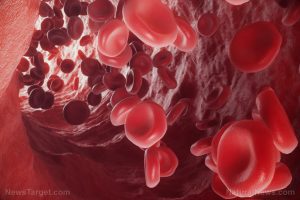
Coagulation factor VIIa – uses, health risks, and side effects at NaturalPedia.com
Tuesday, August 21, 2018 by Ralph Flores
http://www.naturalpedia.com/coagulation-factor-vii-uses-health-risks-and-side-effects-at-naturalpedia-com.html

Coagulation factor VIIa (brand name: NovoSeven, also known as factor VIIa) is a man-made protein used to prevent bleeding in patients with hemophilia. The drug is made to replicate naturally occurring factor VII (factor VIIa) in the body, where it is used to help the blood to clot.
In particular, the drug is administered to patients with hemophilia A and B who have developed antibodies against clotting proteins, such as factor VIII or factor IX, that help stop bleeding. Other conditions where factor VIIa is used include acquired hemophilia, congenital factor VII deficiency, or Glanzmann’s thrombasthenia (a rare genetic platelet disorder).
Factor VIIa comes in a powdered solution and is only administered in a clinical setting, where it is given by or under the direct supervision of a healthcare professional.

Known health risks or side effects of coagulation factor VIIa
Common side effects after the administration of factor VIIa include:
- A mild headache
- Joint pain
- Nausea and vomiting
- Swelling in the affected area
- Mild itching and rash
- Localized pain, redness, swelling, or irritation at the site of injection
If the following occurs, immediately seek emergency medical help:
- Signs of a severe allergic reaction
- Sudden numbness and weakness, especially on one side of the body
- Severe headaches, confusion
- Problems with speech, vision, and balance
- Chest pain, rapid breathing, or fever
- A sudden cough, sometimes accompanied by blood
- Pain, swelling, and redness in one or both legs
- Feeling that you’re about to pass out
- Any bleeding that will not stop
If a person is taking medications to prevent bleeding episodes (e.g., factor IX complex or an anti-inhibitor coagulant complex), he should relay this information to his healthcare professional before starting with factor VIIa.
List of organs that might be affected by coagulation factor VIIa
Factor VIIa use may affect the cardiovascular, hematologic, immunologic, respiratory, and nervous systems. In addition, it may also impact the blood, skin, liver, and gastrointestinal tract.
Food items or nutrients that have similar effects to coagulation factor VIIa
Currently, there is insufficient information on food items or diets that have a similar effect to factor VIIa. In traditional Chinese medicine, rhubarb is used to treat bleeding or hemorrhaging; however, studies are still needed if the plant can also be used to treat hemophilia. If you are to take rhubarb, discontinue after two weeks as it may cause gastrointestinal irritation.
Treatments, management options for the side effects of coagulation factor VIIa
Patients with hemophilia are usually given a daily exercise routine to strengthen the muscles and help prevent injuries that may aggravate the condition. In particular, stretches are preferred over contact sports, which can increase the risk of injury.
Where to learn more
- 10 More Reasons Why You Need Coconut Oil
- A surprising Ebola treatment option: melatonin
- Vaccine philosophical exemptions: A moral and ethical imperative
- Pineapple Compound Treats Cancer, Inflammation and Poor Digestion
- The American Cancer Society runs with the money and away from the cure, Part VII
Summary
Coagulation factor VIIa is used to prevent bleeding in patients with hemophilia A and B who have developed antibodies against clotting proteins, such as factor VIII or factor IX, that help stop bleeding.
Coagulation factor VIIa is also given to patients with acquired hemophilia, congenital factor VII deficiency, or Glanzmann’s thrombasthenia.
Coagulation factor VIIa is only administered in a clinical setting.
Coagulation factor VIIa affects the cardiovascular, hematologic, immunologic, respiratory, and nervous systems.
Sources include:
Tagged Under: Tags: coagulation factor VIIa





